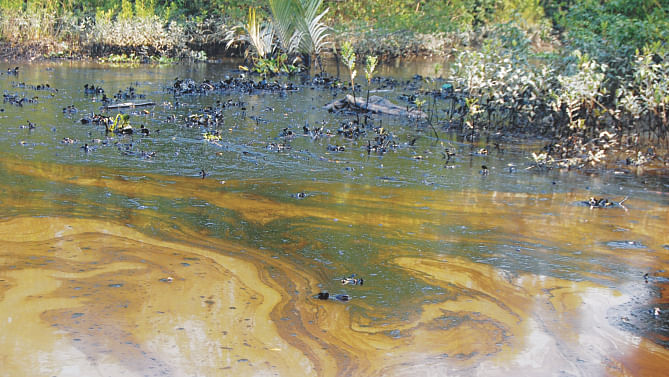BIWTA to revive original route
BIWTA to revive original route

It took the Southern Star-7 disaster for the BIWTA to wake up and hurry with the dredging of Mongla-Ghasiakhali channel and restore the navigability on the original route for commercial vessels.
Vessels were using an alternative route via the Shela river through the Sundarbans for over a decade as the channel lost its navigability. The number of vessels using the route had increased since 2012 when the Bangladesh and India goods carrying protocol was revived.
The Bangladesh Inland Water Transport Authority had allowed vessels to use the alternative route ignoring objections from the Department of Forest.
Anticipating a disaster like the massive oil spill from Southern Star-7, environmentalists had been expressing concerns about operating commercial vessels inside the Sundarbans since the beginning.
However, following the accident, the authorities have banned all vessels on the Shela river until further notice.
“Hopefully, the dredging work of the Mongla-Ghasiakhali channel will be finished in the next four to five months,” Shamsuddoha Khandakar, chairman of the BIWTA, told The Daily Star yesterday.
However, officials from the departments of forest and environment expressed doubt about the dredging being done in four to five months. They, seeking anonymity, claimed that the BIWTA had only managed to do 18 percent of the job since June this year.
The BIWTA chairman said there was a budget of Tk 200 crore for dredging and removal of 100 lakh tonnes of silt.
On June 2, dredging of the channel began and work on about five to six kilometres out of the total 31km was done, the chairman said.
A Chinese company was given the job of removing 32 lakh cubic metres of silt from the channel at a cost of Tk 88 crore, he said.
The BIWTA has also given permission to the Raampaal power plant to collect soil from the channel. The plant would dredge and collect soil itself, the chairman added.
The Mongla-Ghasiakhali channel is vital for Bangladesh and India as ships to and from Kolkata use the route. In 2013-14 financial year, over 1.11 crore tonnes of goods were carried on this route.
Since, the government has stopped operation of commercial vessels through the Shela, commercial vessels would now operate on the Pashur river, which is a 70-80km detour.